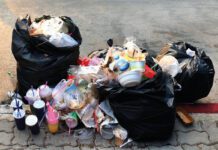
Many countries and cities are trying to reduce their usage of plastic, and to approach the ideal of “zero waste”, but which ones are leading the way?
Discount code and charity fundraising website Savoo says it has analysed the number of zero waste stores and flea markets available in a city, as well as their recycling rate, plastic bag regulations and their amount of household and plastic waste, in a bid to determine which locations are most committed to being plastic-free.

And by this reckoning, Bogotá takes the crown as the world’s zero waste capital. Located in the centre of the country, Bogotá has a staggering 176 flea markets open in the town, according to Google.
Banning the use of plastic bags since 2017, the Colombian city generates one of the lowest amounts of plastic waste at 2,413,455 tons a year. Producing just 70 kg per capita a year, the nation also boasts a low volume of household food waste.
Shoppers looking to splash a little cash on vintage, unique items should seemingly head to Bangkok. Home to 192 flea markets, Bangkok is known to hold some of the world’s best floating markets. Ranking in second place, 19% of municipal waste is recycled in Thailand and the country banned the use of plastic bags last year in 2021.
London places in ninth position. Consumers hoping to reduce their plastic waste consumption should head to the English capital due to its large quantity of zero waste stores available to the public (25). To help the reduction of plastic waste, the nation currently charges 10p per single-use carrier bag.
Ranking ninth overall, the United Kingdom generates one of the lowest amounts of plastic waste in the world at 4,925,590 tonnes a year, but it’s Funafuti in Tuvalu that produces the smallest amount of plastic waste a year at 554 tons.
When looking at which countries recycle the most household waste, these were the top five:
- Singapore (61% recycling rate)
- South Korea (58%)
- Iceland (55.8%)
- Slovenia (52%)
- Germany (48%)
Analysing the data, Savoo suggested it was able to determine which cities rank worst for moving towards zero waste, and by this method the city of Skopje, North Macedonia comes first (as in “the worst”). Known for its rich architecture, the city has no zero waste store available and just 8 flea markets open.
“With a recycling rate of less than 1% (0.2%), it’s no surprise that the city made the bottom of the list,” says Savoo.
But who else is failing in the race to zero waste?

Two central European cities have made the bottom ten: Bern, Switzerland and Budapest, Hungary. Both cities charge their citizens for the use of plastic bags; however, the charge in Bern is completely voluntary.
Both cities have scored poorly, thanks in large part to the low number of zero waste shops available in each place – two in Bern and three in Budapest. Although Bern and Budapest have a high recycling rate (30% and 26% respectively), the high volume of household food waste in each town has lowered its overall score.
Caster sugar appeared to be the most expensive purchase to make at a zero waste store.
Shoppers have opted out from buying at the supermarket, choosing to support local stores instead, where plastic-free options are more obtainable. But have you ever wondered how much it actually costs to move to a zero waste lifestyle?
Savoo has analysed the average cost of groceries in the supermarket and zero waste stores to find out how much more you are saving or spending by going plastic-free.
On average, groceries from a zero waste store cost 212% more than groceries from the supermarket. Our findings show that caster sugar has the biggest markup, with 100g of sugar in the supermarket costing only 20p, while 100g in a zero waste store costs a whopping £2.74.
Other items that have a large price increase are garlic powder and white basmati rice (128% and 112% respectively). If you are looking to save some coins while shopping in a zero waste shop, then peppercorn is the way to go. You can expect to save 6p per 100g by shopping plastic-free.
Ed Fleming, Managing Director at Savoo commented:
“Our research shows that the world is making a conscious effort to reduce the amount of plastic that is produced and consumed. With the high number of flea markets and low volume of plastic waste, Bogotá is leading the way to become plastic-free, and it’s only a matter of time before other nations follow suit.
“Though choosing to live a zero waste lifestyle can seem daunting and expensive at first, the conscious effort you make when shopping for items will not only reduce your own waste but eventually save you more in the future.”
You can find out more about Savoo here.







